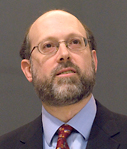Censorship of the 17th Century has come back to life in modern times, as a result of laws that require universities to force faculty and students to get permission before doing research or publishing their work, says a distinguished legal historian and scholar of constitutional law.

Centuries ago, the Inquisition in Italy and the Star Chamber in England required each author to get a license — or permission — before publishing any book or other printed material. This was the licensing or censorship that led to Galileo being jailed for many years, says Columbia Law School professor Philip Hamburger.
Today, the federal government requires universities, including U-M, to impose similar licensing on a wide array of scholarship — the mechanism being Institutional Review Boards.
“This is probably the most systematic and widespread violation of the First Amendment in the nation’s history,” he says.
Hamburger will present the 2009 Davis, Markert, Nickerson Lecture on Academic and Intellectual Freedom at 4 p.m. Nov. 9 in Honigman Auditorium, 100 Hutchins Hall, Law School. His lecture, titled “Galileo’s Ghost — 17th Century Censorship in 21st Century America,” is free and open to the public.
Hamburger is known for his work on the First Amendment — both on religious liberty and on freedom of speech.
He has taught at law schools at the University of Chicago, George Washington University, University of Connecticut, University of Virginia and Northwestern University. Hamburger received his Bachelor of Arts in history (summa cum laude) from Princeton University and his juris doctorate from the Yale University Law School.
Each university requires professors and students dealing with human subjects to get permission from its IRB before talking to people, before reading and before publishing, he says. These regulations have been around in one form or another since the 1970s.
U-M officials say the ethical mandate to treat human subjects with respect and not expose them to unnecessary risk of harm applies to all research.
“IRB review and oversight not only is required for federally sponsored research and for drug and device development, it also is an essential component of U-M’s participant protection program,” says Judith Nowack, associate vice president for research.
The annual lecture is named for three U-M faculty members — Chandler Davis, Clement Markert and Mark Nickerson — who in 1954 were called to testify before the House Un-American Activities Committee. All invoked constitutional rights and refused to answer questions about their political associations. The three were suspended from the university with subsequent hearings and committee actions resulting in the reinstatement of Markert, an assistant professor who eventually gained tenure, and the dismissal of Davis, an instructor, and Nickerson, a tenured associate professor.
The lecture is sponsored by the Academic Freedom Lecture Fund, American Association of University Professors Michigan Conference and University of Michigan-Ann Arbor Chapter, Office of the President, Office of the Provost, Office of the Vice President for Communications, Law School and the Senate Advisory Committee on University Affairs.

